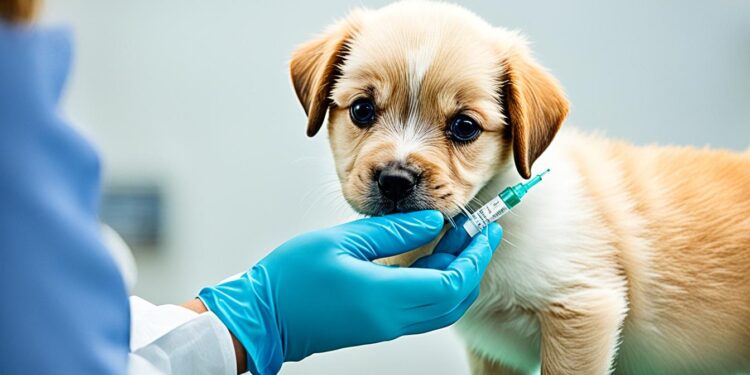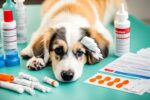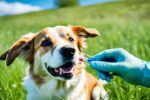Why Parvovirus Vaccine is Crucial for Puppies

Did you know that puppies are highly susceptible to parvovirus, a highly contagious and dangerous disease?
Parvovirus is a disease that dogs can contract through direct or indirect contact with an infected dog or contaminated objects. However, puppies are particularly vulnerable to parvo between 6 weeks and 6 months of age, putting them at a greater risk of severe illness and even death. The impact of parvo on puppies is staggering, making it essential for puppy owners to take proactive measures to protect their furry companions.
To safeguard puppies from the devastating effects of parvovirus, it is crucial that they receive a series of parvo vaccinations. These vaccinations should be administered at 6, 8, and 12 weeks of age, with a booster vaccine between 14 and 16 weeks. By following this vaccination schedule, puppy owners can significantly reduce the risk of their puppies contracting parvo and increase their chances of a healthy life.
Symptoms of parvovirus in puppies include bloody diarrhea, vomiting, fever, lethargy, and refusal to eat. While there is no known cure for parvo, prompt medical treatment from a veterinarian can greatly improve a puppy’s chances of survival. However, prevention is always better than relying on treatment. That’s why vaccinating puppies against parvovirus is vital in the fight against this devastating disease.
So, if you’re a proud puppy owner, make sure to prioritize the parvovirus vaccine for your furry friend’s well-being. Not only will it protect them from the dangers of parvovirus, but it will also give you peace of mind knowing that you’ve taken a crucial step in safeguarding their health and happiness.
The Importance of Canine Parvovirus Vaccine
The canine parvovirus vaccine is a crucial preventive measure to protect dogs from the devastating effects of canine parvovirus. As an essential part of a dog’s vaccination schedule, this vaccine plays a vital role in ensuring their overall health and well-being.
Canine parvovirus, commonly known as parvo, is a highly contagious and potentially life-threatening viral infection that primarily affects puppies and unvaccinated dogs. The virus spreads through direct contact with infected dogs, contaminated objects, or even fecal matter.
The parvovirus vaccine is administered as part of a combination injection, which also provides protection against diseases such as distemper, adenovirus, and parainfluenza. This combination vaccine is considered a core vaccine by veterinary associations worldwide, emphasizing its importance in preventing the spread of infectious diseases in the dog population.
The vaccine is available in two forms: modified live virus (MLV) and inactivated (killed) vaccine. MLV vaccines are widely preferred in North America due to their effectiveness and long-lasting immunity. The vaccine works by stimulating the production of neutralizing antibodies, which play a crucial role in fighting off the virus.
Puppies should receive their first parvovirus vaccine at 8 to 9 weeks of age, followed by booster shots every 3 to 4 weeks until they reach 14 to 16 weeks. These multiple doses are necessary to ensure optimal protection against the virus and to overcome any interference from maternally derived antibodies, which can reduce the vaccine’s effectiveness.
Adult dogs should also receive regular vaccinations to maintain their immunity. It is recommended to vaccinate adult dogs every 3 years to ensure continued protection against parvovirus and other infectious diseases.
While adverse reactions to the parvovirus vaccine are rare, they can include type I hypersensitivity reactions and inflammatory immune responses. It is important to consult with a veterinarian to assess any potential risks and benefits of vaccination for individual dogs.
Parvovirus Vaccine Types:
1. Modified Live Virus (MLV) Vaccine: This type of vaccine contains a weakened form of the parvovirus, which stimulates the immune system to produce a robust and long-lasting response. MLV vaccines are highly effective and commonly used in North America.
2. Inactivated (Killed) Vaccine: The inactivated vaccine contains a killed version of the parvovirus. It provides adequate protection but may require additional booster shots to ensure long-term immunity.
Vaccination Schedule for Dogs:
| Vaccine Dose | Puppy Age |
|---|---|
| 1st Dose | 8-9 weeks |
| 2nd Dose | 11-12 weeks |
| 3rd Dose | 14-16 weeks |
| Booster Shots | Every 3 years (adult dogs) |
Regularly vaccinating dogs against canine parvovirus is essential to maintain their health and protect them from this highly contagious disease. By following the recommended vaccination schedule and consulting with a veterinarian, you can ensure that your pets are effectively protected against parvovirus.
Understanding Canine Parvovirus and its Vaccination
Canine parvovirus is a highly contagious disease caused by infection with CPV-2a, -2b, or -2c strains. While it primarily affects puppies between 6 weeks and 6 months of age, dogs of any age can be infected. The main route of transmission is through fecal-oral contact, making puppies especially vulnerable.
Once infected, parvovirus replicates in rapidly dividing cells and targets the small intestine, leading to severe enteritis. Clinical signs of parvo include anorexia, depression, vomiting, and diarrhea that can be mucoid or hemorrhagic. Dogs may also experience abdominal pain and lymphopenia, a common hematologic finding. In some cases, complications such as septic shock and multiorgan dysfunction syndrome can occur.
Treatment for parvovirus can be costly, but it significantly increases the chances of survival. However, prevention through vaccination remains the best approach. Canine parvovirus vaccines should be administered according to a specific schedule, starting at 8 to 9 weeks of age for puppies, with boosters given every 3 to 4 weeks until 14 to 16 weeks of age. Adult dogs should be vaccinated every 3 years to maintain immunity.
By understanding the pathophysiology of parvovirus and recognizing the clinical signs, pet owners can take proactive steps to protect their dogs. Vaccination plays a crucial role in preventing this devastating disease, ensuring better outcomes for our canine companions.
FAQ
What is parvovirus and why is the vaccine important for puppies?
How often should puppies be vaccinated against parvovirus?
What are the symptoms of parvovirus in puppies?
Can parvovirus be cured?
Why is vaccination the best way to prevent parvovirus in puppies?
Is the parvovirus vaccine a core vaccine for dogs?
What diseases does the parvovirus vaccine protect against?
How is the parvovirus vaccine administered?
When should puppies receive their first parvovirus vaccine?
How often should adult dogs be vaccinated against parvovirus?
Are there any adverse reactions to the parvovirus vaccine?
How is canine parvovirus transmitted?
Who is most susceptible to parvovirus?
What are the clinical signs of parvovirus?
What are the potential complications of parvovirus?
Does treatment for parvovirus increase the chances of survival?
Source Links
- https://www.dailypaws.com/dogs-puppies/health-care/dog-preventative-care/parvo-vaccine-for-dogs
- https://www.kirraweevet.com.au/pet-care/pet-care-for-dogs/why-you-need-to-vaccinate-your-puppy-before-you-walk-it.html
- https://todaysveterinarypractice.com/preventive-medicine/canine-parvovirus-vaccination/






